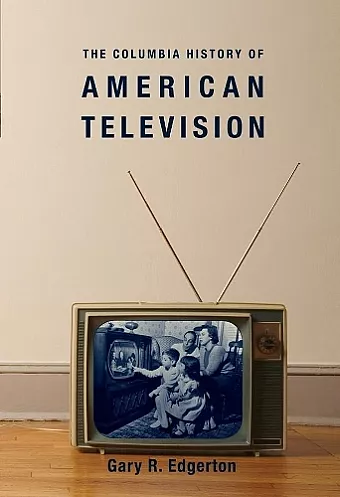The Columbia History of American Television
Format:Paperback
Publisher:Columbia University Press
Published:24th Feb '09
Currently unavailable, and unfortunately no date known when it will be back

Richly researched and engaging, The Columbia History of American Television tracks the growth of TV into a convergent technology, a global industry, a social catalyst, a viable art form, and a complex and dynamic reflection of the American mind and character. Renowned media historian Gary R. Edgerton follows the technological progress and increasing cultural relevance of television from its prehistory (before 1947) to the Network Era (1948-1975) and the Cable Era (1976-1994). He considers the remodeling of television's look and purpose during World War II; the gender, racial, and ethnic components of its early broadcasts and audiences; its transformation of postwar America; and its function in the political life of the country. In conclusion, Edgerton takes a discerning look at our current Digital Era and the new forms of instantaneous communication that continue to change America's social, political, and economic landscape.
Television is a form of media without equal. It has revolutionized the way we learn about and communicate with the world and has reinvented the way we experience ourselves and others. More than just cheap entertainment, TV is an undeniable component of our culture and contains many clues to who we are, what we value, and where we might be headed in the future. Media historian Gary R. Edgerton follows the technological developments and increasing cultural relevance of TV from its prehistory (before 1947) to the Network Era (1948-1975) and the Cable Era (1976-1994). He begins with the laying of the first telegraph line in 1844, which gave rise to the idea that images and sounds could be transmitted over long distances. He then considers the remodeling of television's look and purpose during World War II; the gender, racial, and ethnic components of its early broadcasts and audiences; its transformation of postwar America; and its function in the political life of the country. He talks of the birth of prime time and cable, the influence of innovators like Sylvester "Pat" Weaver, Roone Arledge, and Ted Turner, as well as television's entrance into the international market, describing the ascent of such programs as Dallas and The Cosby Show, and the impact these exports have had on transmitting American culture abroad. Edgerton concludes with a discerning look at our current Digital Era (1995-present) and the new forms of instantaneous communication that continue to change America's social, political, and economic landscape. Richly researched and engaging, Edgerton's history tracks television's growth into a convergent technology, a global industry, a social catalyst, a viable art form, and a complex and dynamic reflection of the American mind and character. It took only ten years for television to penetrate thirty-five million households, and by 1983, the average home kept their set on for more than seven hours a day. The Columbia History of American Television illuminates our complex relationship with this singular medium and provides historical and critical knowledge for understanding TV as a technology, an industry, an art form, and an institutional force.
A useful overview... [that] captures the technological, economic, and cultural sweep of an industry that influenced... what would become the Global Village. -- Bill Ruehlmann The Virginian-Pilot An extensive, readable... informative, well-written study... Recommended. CHOICE A tour-de-force narrative of more than six decades of American television and its impact on U.S. society... An important contribution. -- Christopher H. Sterling Communication Booknotes Quarterly An excellent addition to any undergraduate library and also a nice addition to public libraries. -- Linda W. Hacker American Reference Books Annual A marvelous, detailed, and comprehensive narrative... This remarkable book, unquestionably one-of-a-kind, belongs in every reference library. -- Robert Fyne Film & History Positioned with the monumental works of Erik Barnouw, Asa Briggs, Christopher Sterling and John Kittross, Edgerton contributes a comprehensive study of American television's popular culture... The Columbia History of American Television should be on the shelf of every television historian and popular culture scholar, as well as the non-specialist. -- Donald G. Godfrey Journal of Broadcasting and Electronic Media A seminal work of meticulous scholarship... Welcome and highly recommended. -- James A. Cox The Midwest Book Review Highly informative... eminently readable... Edgerton tells a compelling history of the medium. His book would work well as a primer for general readers, as well as for scholars (particularly international readers) wanting to gain an understanding of the history, forms, and economics of the U.S. television system as well as pointers for further research from his meticulous referencing. -- Faye Woods Journal of American Studies [The book] is meticulous and inspired. Devoted to television, it is richly resourced, eloquently written, and nicely illustrated. -- Craig Allen American Journalism This book is best seen as an update of Erik Barnouw's widely read and concise history, Tube of Plenty: The Evolution of American Television. Moving beyond Barnouw, Edgerton has attempted to craft a unified narrative that simultaneously engages some of the more fine-grained scholarship in the field... A highly readable account of the development of a complex industry and cultural form. -- Michael Kackman Journal of American History A monumental and definitive account of American television. -- Jason Jacobs Media International Australia
- Winner of John G. Cawelti Award for a Noteworthy Book on American Culture 2008
ISBN: 9780231121651
Dimensions: unknown
Weight: unknown
512 pages